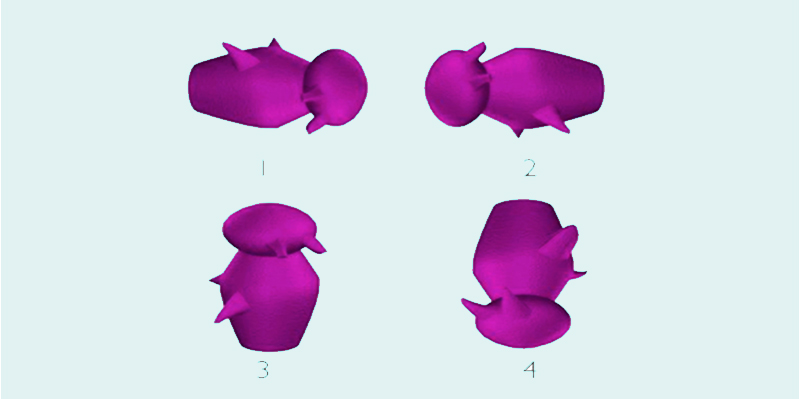Science has taken a big leap forward when it comes to learning more about dementia, with researchers creating what they believe to be a quiz that can flag one’s likelihood of developing the Alzheimer’s disease.
Yes, researchers from the University of Louisville have discovered that those who aren’t able to tell which shape is the odd one out in this picture could, in fact, be at greater risk of developing the brain disease in the future.

^Can you spot the difference?
When conducting the (small) study, which was published in the Journal of Alzheimer’s Disease in April, 57 participants were asked to identify the differences between four images of objects, faces, scenes and the aforementioned purple ‘Greebles’.
In each set, according to Dr. Oz, The Good Life, one image was slightly different from the rest.
What the results uncovered is that those genetically at-risk of Alzheimer’s typically got the same results as those we aren’t at risk when it analysing the objects, faces and scenes images.
However, when it came to the Greeble comparison test, those most at-risk scored lower than the others.
“Most people have never seen a Greeble and Greebles are highly similar, so they are by far the toughest objects to differentiate,” says lead author of the study, Dr Emily Mason.
“What we found is that, using this task, we were able to find a significant difference between the at-risk group and the control group.”
But what does this mean for those who may be predisposed to developing Alzheimer’s disease?
“Right now, by the time we can detect the disease, it would be very difficult to restore function because so much damage has been done to the brain,” Dr Mason continues.
“We want to be able to look at really early, really subtle changes that are going on in the brain.”
“One way we can do that is with cognitive testing that is directed at a very specific area of the brain.”
While this is a very small study to measure someone’s risk of developing of Alzheimer’s disease effectively, it does shine a spotlight on how identifying someone’s could-be-dementia symptoms earlier on could, in the future, improve their quality of life.
Alzheimer’s disease in Australia
Did you know more than 400,000 Australians are living with dementia at this very minute?
Dementia is the term used to describe the large group of illnesses that cause a steep decline in one’s cognitive ability – including Alzheimer’s disease.
According to Alzheimer’s Australia, Alzheimer’s disease is the most common form of dementia and impacts up to 70 per cent of all people living with dementia, and can be either sporadic or familial.
It can affect people of any age, but the biggest risk for having Alzheimer’s disease is ageing, itself; the older one gets, the more at risk they are of developing Alzheimer’s.
Symptoms of dementia
Memory loss that affects day-to-day function
Difficulty performing familiar tasks
Confusion about time and place
Problems with language
Problems with abstract thinking
Poor or decreased judgement
Problems misplacing things
Changes in personality or behaviour
A loss of initiative
If you would like to learn more about Alzheimer’s disease, call the National Dementia Helpline on 1800 100 500 or visit Alzheimer’s Australia’s website for more information.


